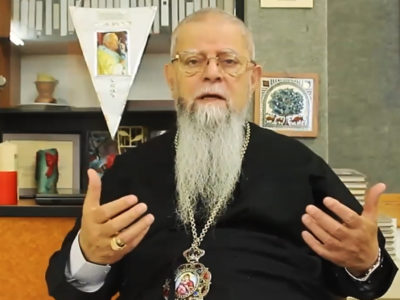Archbishop Emeritus Elias Chacour by Zoom
with permission from Elias Chacour and Messiah Lutheran Church
Recently, I sat in on an Adult Education discussion with Elias Chacour by Zoom with a group from Messiah Lutheran Church in Schenectady, New York. Here are some excerpts from that discussion that I would like to share with all of you. It reminded me about what is so special about the Mar Elias Schools and Fr. Elias Chacour. ~ Brenda Mehos
Q – What are you up to these days?
A – I have been working in the school developing national relations of brother hood and reconciliation. We have one thing in common – whether we are Jews, Palestinians, White or Black Americans… we are born babies. This has been my guide during my life. All people are born of the likes of God. This is not always very easy but my guideline for my life. Now we have 3,000 students at the Mar Elias Schools. When I address these students in the morning, I consider them all my children, whether Muslims or Jews. I care only that all are children of God. The school was built for all to come and find our dignity together.
This past year I was home-bound and I dedicated all my time to writing. I wrote three books:
- A Vision Not a Road Map, This is to say that I was constantly looking for what God wanted from me, and I was permanently ready to do whatever he wanted me to do. It’s about different initiatives in different towns and villages. These are different stories for people to consider God’s great, providence and inspiration.
- It’s to Him to Grow and Me to Diminish, This is a book with different commentaries, mainly reading from the Bible during the Sunday celebrations, as well some pastoral letters from when I was acting Archbishop.
- The Sermon on the Mount, the Way to the Kingdom – It’s some reflections on the central place of the Sermon on the Mount in the life of those who follow Christ. It’s mainly the fulfillment of wishes of many international friends to see me comment on the Beatitudes and wider on the Sermon on the Mount.
These three books reflect my concern to preach repentance and reconciliation. I would like the first and third book translated into English and I’m currently looking for a translator.
Q – How do we help people see each other? We are all so divided right now. Why is it so hard for us to see we are the same? What can the church do?
A – Converting the other to just be human. I am asked by the Lord Jesus to not hate. Even those who hate me, I pray for their wellbeing and I pray for a change of their heart. I’m sure the lord listens and acts. He will do that in his time.
Q – How do you have hope?
A – Hope is the element that keeps us alive and keeps us working. Keeps us looking at the positive side. We should drink and enjoy what is in the glass, not what is missing. There is no bad (dirty) human being. All deserve love and reconciliation.
Q – When someone thinks of someone as less than others how do you stop them?
A – You need to stop yourself from wanting to return evil for evil. This is a very important thing. Jesus never acted against others. Even on the cross he did not react on the cross. He kept with the mission to forgive, to love. He said Father they do not know what they do…forgive them. The brutality of others may kill us but there is resurrection. Over the past 4 years, it’s been sad to see what has happened in America. We know people like Pilgrims of Ibillin and this is the face of America. The last 4 years with racism, and violence is not the America that we know.
Q – Some of my heroes are like Nelson Mandela and you are in this category. Do you think what happened in South Africa could happen in Israel/Palestine?
A – Desmund Tutu is my friend. While we were speaking together, he got so excited he jumped from his chair. He said, “the white people want us to be slaves, but the Israeli’s want you to actually disappear!” He actually proved to be right. Desmund Tutu is a prophet.
Q – What has humanity learned from the pandemic?
A – We need to learn that oppressing people is not the way to treat others. It’s the job of pastors to keep telling people this and don’t give up. We cannot convert the whole world, but we start with ourselves and those close to us.
Q – We are hearing the settlements in West Bank have ended the chance for a 2-state solution. Abuna, you always seem to support a one state solution.
A – Settlers are not God. Only God is in control. We need a 2-state solution that gives Palestinians dignity, or a one-state with all having dignity. Gaza needs their land with control of it. I think Israel is in a difficult situation. They have created their own monster which is 6 million people occupying 5 million and pretending that 5 million need to leave the land. We want Jews to survive, and we want them to be our brothers.
Q – While working with children, how do you teach peace?
A – We have children who come from 30 villages and they come from many traditions. Muslims come with prejudice against Christians and vice versa. Our task is to slowly show them that it’s enjoyable to know each other and appreciate each other. That’s what we need to do… teach them that the other is a potential friend!

